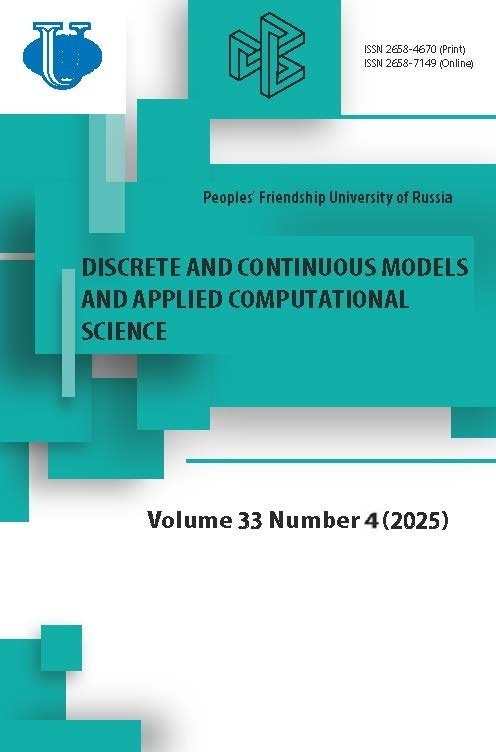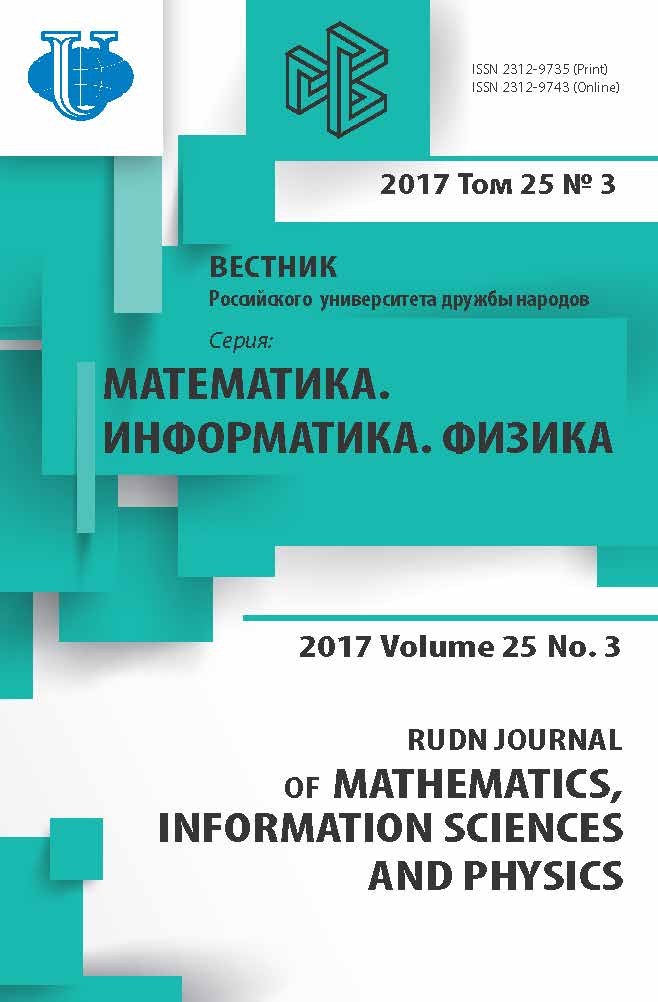About Probability Characteristics Evaluation in Queuing System with Limited Resources and Random Requirements
- Authors: Vikhrova OG1
-
Affiliations:
- Peoples’ Friendship University of Russia (RUDN University)
- Issue: Vol 25, No 3 (2017)
- Pages: 209-216
- Section: Mathematical Teletraffic Theory and Telecommunication Networks
- URL: https://journals.rudn.ru/miph/article/view/16204
- DOI: https://doi.org/10.22363/2312-9735-2017-25-3-209-216
- ID: 16204
Cite item
Full Text
Abstract
Mobile data traffic increases on everyday basis for the last decade and is going to keep this trend in the near future. Exponential growth of data traffic in wireless networks accelerates the development of new technologies and the transition to 5G networks. The ongoing improvements will allow to increase the channels throughput and will allow devices to simultaneously support both cellular and Wi-Fi networks, and even allow direct device-to-device (D2D) connection without any base station involved. Evolving heterogeneous networks promise more efficient radio resources usage by a macro cell traffic offloading to the small cells and uplink and downlink decoupling (DUDe). A resource-sharing model in heterogeneous networks is for the first time proposed to be analyzed in terms of queuing system with random requirements. We suggest a multiserver queuing network with limited resources where each class of customers requires a random vector of resources to be served. It has been proved that stationary probabilities of the system with aggregated flow of customers with mean-weighted requirement are equal to the stationary probabilities of the suggested system. The analytical method for the key probability characteristics evaluation requires calculating all k-fold convolutions for each set of vectors requirements. We propose a recurrent computation algorithm for normalization constant evaluation and efficient formulas for blocking probability, mean volume and variance of the occupied resources.
About the authors
O G Vikhrova
Peoples’ Friendship University of Russia (RUDN University)
Author for correspondence.
Email: vikhrova_og@rudn.university
Department of Applied Probability and Informatics
6 Miklukho-Maklaya St., Moscow, 117198, Russian FederationReferences
- Cisco Visual Networking Index: Global Mobile Data Traffic Forecast Update, 2016-2021 (2017). URL http://www.cisco.com/c/en/us/solutions/collateral/service-provider/visual-networking-index-vni/mobile-white-paper-c11-520862.html
- J. Andrews, H. Claussen, M. Dohler, S. Rangan, Femtocells: Past, Present, and Future, IEEE JSAC 30 (3) (2012) 497–508.
- G. Fodor, S. Parkvall, S. Sorrentino, P. Wallentin, Q.Lu, N. Brahmi, Device-to-Device Communications for National Security and Public Safety, IEEE Access 2 (1) (2014) 1510–1520.
- F. Boccardi, J. Andrews, H. Elshaer, M. Dohler, S. Parkvall, P. Popovski, S. Singh, Why to Decouple the Uplink and Downlink in Cellular Networks and How To Do It, IEEE Communications Magazine 54 (3) (2016) 110–117.
- S. Singh, X. Zhang, J. Andrews, Joint Rate and SINR Coverage Analysis for Decoupled Up-link-Downlink Biased Cell Associations in HetNets, IEEE Transactions on Wireless Communication 14 (10) (2015) 5360–5373.
- H. Elshaer, F. Boccardi, M. Dohler, R. Irmer, Downlink and Uplink Decoupling: A Disruptive Architectural Design for 5G Networks, Global Communications Conference (GLOBECOM) (2014) 1798–1803.
- V. Naumov, K. Samouylov, E. Sopin, N. Yarkina, S. Andreev, A. Samuylov, LTE Performance Analysis Using Queuing Systems with Finite Resources and Random Requirements, in: 7th International Congress on Ultra Modern Telecommunications and Control Systems and Workshops, 6–8 Oct. 2015, IEEE, 2015, pp. 100–103. doi: 10.1109/ICUMT.2015.7382412.
- O.M. Tikhonenko, Destricted Capacity Queueing Systems: Determination of their Characteristics, Automation and Remote Control 58 (1997) 969–973.
- O.M. Tikhonenko, Generalized Erlang Problem for Service Systems with Finite Total Capacity, Problems of Information Transmission 41 (2005) 243–253.
- V.A. Naumov, K.E. Samouylov, On the Modeling of Queuing Systems with Multiple Resources, Bulletin of Peoples’ Friendship University of Russia. Series: Mathematics. Information Sciences. Physics (3) (2014) 58–62.
- V.A. Naumov, K.E. Samouylov, A.K. Samouylov, On the Total Amount of Resources Occupied by Serviced Customers, Automation and Remote Control 77 (2016) 1419–1427.
- V. Naumov, K. Samuoylov, E. Sopin, S. Andreev, Two Approaches to Analysis of Queuing Systems with Limited Resources, in: Ultra Modern Telecommunications and Control Systems and Workshops, 6–8 Oct. 2014, IEEE, 2014, pp. 485–488. doi: 10.1109/ICUMT.2014.7002149.
- K. Samouylov, E. Sopin, O. Vikhrova, Analyzing Blocking Probability in LTE Wireless Network via Queuing System with Finite Amount of Resources, Communications in Computer and Information Science 564 (2015) 393–403.
- K. Samouylov, E. Sopin, O. Vikhrova, On Design of Efficient Algorithm for Blocking Probability Calculation in Queuing System with Random Requirements, in: Information technologies and mathematical modelling (ITMM–2016): XV International Scientific Conference named after A. F. Terpugov, Vol. 1, Tomsk State University, 2016, pp. 192–197.
- J.P. Buzen, Computational Algorithms for Closed Queueing Networks with Exponential Servers, Communications of the ACM 19 (9) (1973) 527–531.
Supplementary files















